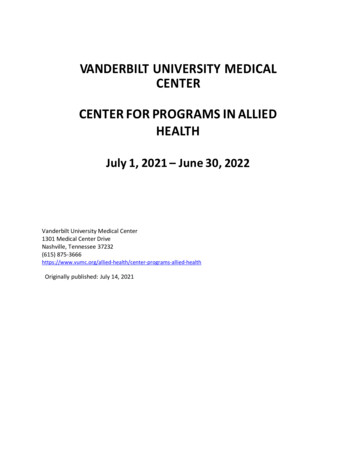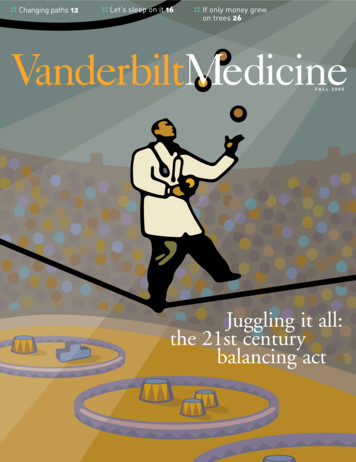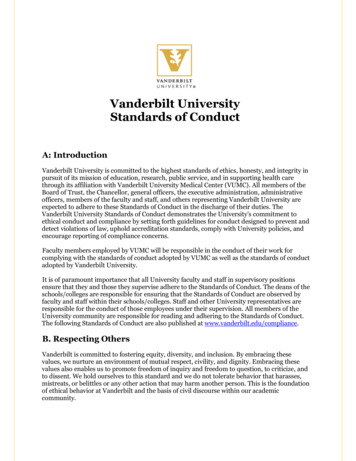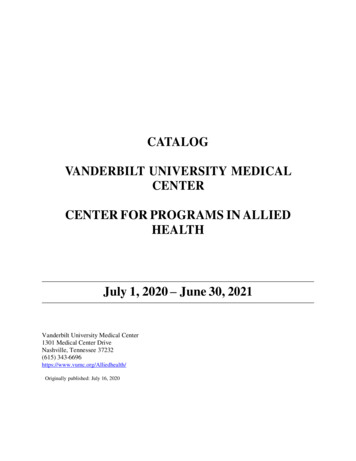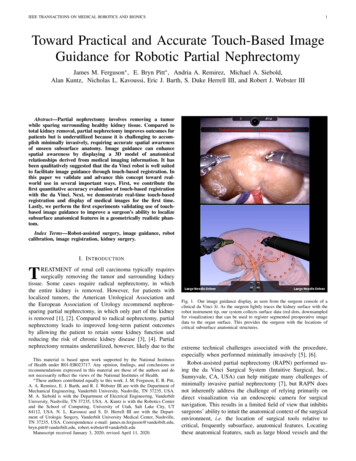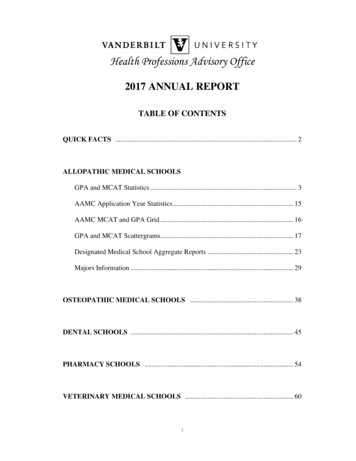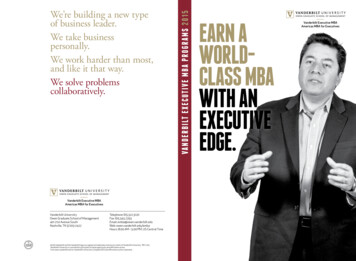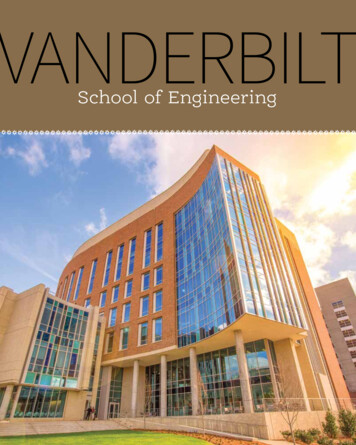
Transcription
VANDERBILTSchool of Engineering
ENGINEERINGOur curriculum allows you to examine various engineeringmajors from multiple perspectives before you declare a specificmajor. As an engineering student, you will explore engineeringfundamentals and the responsible use of technology.All of our students study in state-of-the-art classrooms andlaboratories, and you may choose to conduct original researchby working with outstanding faculty members. Professors andstudents collaborate on projects that span the spectrum ofengineering from robotics and computer animation to biomedicaloptics and environmental engineering.Our engineering graduates are valued for their expertise,intellectual independence, communication skills, and leadershipability. Professional demand for graduates with this background isintense. Graduates are actively recruited, not only for engineeringcareers, but also for careers as diverse as consulting, medicine,law, and finance.Vanderbilt’s School of Engineering offers the depth and breadth ofeducation required to solve real-world problems. Understandinghow to solve these problems will give you an edge in any endeavor.ACADEMIC DEPARTMENTSBiomedical EngineeringChemical and Biomolecular EngineeringCivil and Environmental EngineeringElectrical Engineering and Computer ScienceGeneral EngineeringMechanical EngineeringAll programs leading to the bachelor of engineering at Vanderbiltare accredited by the Engineering Accreditation Commission ofABET, abet.org. The bachelor of science in computer science isaccredited by the Computing Accreditation Commission of ABET.Vanderbilt also encourages students to take the Fundamentals ofEngineering examinations, coordinated by the Tennessee StateBoard of Architecture and Engineering Examiners. VanderbiltUniversity is accredited by the Southern Association of Collegesand Schools Commission on Colleges and is a member of theAssociation of American Universities.Cover: New in 2016, the 230,000-square-foot Engineeringand Science Building is specifically designed to fosterteamwork and includes an Innovation Pavilion that connectsstudents and faculty with industry mentors.Right: Inside the Vanderbilt Institute of Nanoscale Scienceand Engineering’s commercial-grade cleanroom, used by faculty,researchers, and students in engineering, chemistry, and physics.2engineering.vanderbilt.edu
INSIGHT,innovation ,IMPACT. Vanderbilt appeals toengineering studentswho want to put theircareers and lives into arich context. You willlearn creative thinkingand problem solvingskills that will be valuablethroughout your life.engineering.vanderbilt.edu3
The School of Engineering offers the bachelorStudents launch a NASAweather balloon ahead ofthe 2018 solar eclipse.of engineering in biomedical, chemical,civil, computer, electrical, and mechanicalengineering and the bachelor of science incomputer science and engineering science.The school also confers master of engineering,master of science, and doctoral degrees.All full-time faculty members hold doctorates and teach undergraduate students. Our research centers and labs investigatetopics from nanoscale materials, technology-guided surgery,and robotics to environmental management, intracellularengineering, and systems resilience.Many engineering students choose double majors, minors,or concentrations in complementary disciplines. In additionto training in engineering science, mathematics, physics, andchemistry, you will take liberal arts courses in the College of Artsand Science. You may also choose selected courses from Vanderbilt’s other undergraduate or graduate schools or round outyour academic experience with an honors program, internship,engineering-based study abroad, or accelerated degree program.94%OF SENIORSGRADUATING FROM VANDERBILT ARESATISFIED WITH THEQUALITY OF INSTRUCTION4engineering.vanderbilt.edu
Professor Joshua Caldwell, second fromleft, works with student researchers inhis lab, where he explores nano-optics,nanophotonics, infrared optics andimaging, and other related areas.Our multimillion-dollar engineering complex combines advancedtechnologies in a student-centered environment. Featheringill Hallfeatures a three-story atrium for student interactions and containsmore than fifty teaching and research laboratories brimming with thelatest equipment. The design studio, model shop, and project roomshowcase student ideas from concept to prototype to final product.Extending the application of our student-centered physical spaces, anew seven-story Engineering and Science Building opened in 2016.This newest addition to the engineering complex is designed to fosterproject teamwork and offer programs, instrumentation areas,makerspaces, and core research space that will promote interdisciplinary work and allow for even greater collaboration betweenstudents and faculty across disciplines.engineering.vanderbilt.edu5
ONE-ON-ONE WITHHiba Baroud, Ph.D.As a math whiz growing up near Beirut, Lebanon, Professor HibaBaroud thought she’d be an actuary, working for an insurancecompany or corporation. Instead, she found a way to combine herrisk analysis and statistics skills, her love of teaching, and her passionfor helping people in need.6engineering.vanderbilt.edu
“Vanderbilt offers aIn a world with more frequent extreme weather events, basing newbridges on historical weather data and previous structure wearnurturing environmentno longer works. Bayesian modeling is based on more than whatand is a great place tohappened when, for example, three successive hurricanes hit Florida.advance a career. I havebeen fortunate to work withamazing colleagues andstudents in the departmentas well as across the Schoolof Engineering and theuniversity.”It factors in expertise from emergency officials, climate change data,information about materials used in infrastructure, and potentiallya hundred other data points.“Bayesian modeling gives you a probability distribution—a numberof possible events and outcomes,” Baroud said. “It allows you toincorporate the stakeholders in the decision-making process. Ifsomeone is risk averse, they want to build the most robust bridgethat will withstand any potential hazard. They will go with aparameter that is looking at more extreme cases. Others may begeared toward more profit, so they would be risk-taking, valuing amore cost-effective solution.”Hiba BaroudAssistant Professor of Civil andEnvironmental EngineeringProfessor Baroud also is collaborating on an NSF project to study thetrade-off of allocating water between hydroelectric power generationand crop irrigation to minimize unemployment and maximize foodproduction. She has become part of several new programs at theVanderbilt Center for Transportation and Operational Resiliency,including a winning proposal in the National Disaster ResilienceCompetition to study river supply chain dynamics in extreme weatherevents, with the support of the U.S. Department of Housing andUrban Development. In addition, she is on teams for two VanderbiltUniversity 2016 research awards—the Vanderbilt Initiative on SmartIn addition to advising undergraduate research interns,Baroud is leading a project funded by the National ScienceFoundation that looks beyond historical weather patterns andCities Operations Research and the Vanderbilt Initiative for IntelligentResilient Infrastructure Systems.While her accomplishments continue to grow in numbers, Baroud isinfrastructure reliability to better measure and analyze risk andquick to share the credit. “Vanderbilt offers a nurturing environmentresilience. The team is focused on using Bayesian statisticaland is a great place to advance a career. I have been fortunate to workmodeling to predict outcomes in extreme weather events andwith amazing colleagues and students in the department as well asmodels of how communities can best recover from them.across the School of Engineering and the university.”engineering.vanderbilt.edu7
Engineering ProgramsIn addition to foundations in math, chemistry,Chemical Engineeringphysics, and the liberal arts, our eight academicBachelor of Engineeringmajors provide depth of study in a wide varietyof traditional engineering disciplines and somethat can be customized based on individualinterests. Minors, as well as electives, should beselected carefully to fulfill a specific purpose andin consultation with your academic adviser.Biomedical EngineeringBachelor of EngineeringBiomedical engineering applies engineering concepts to specificand practical problems in biology, medicine, and health care. Itattempts to quantify biological events for the purpose of creating andimproving upon diagnostic practices and treatment protocols. Themain areas of study in our biomedical engineering program includebiophotonics, biomaterials, medical imaging, gene therapy, andtechnology-guided surgical devices.Computer science majorChristian Motyczka helpeddevelop a virtual realityprogram to help addictsstay clean.Chemical and biomolecular engineering play a key role in the development and production of pharmaceuticals and bioengineeredmaterials for medical applications. Chemical engineers are alsoconcerned with process control techniques and production in thedevelopment of high-strength composites and specialty polymers,semiconductors and microelectronic devices, and a variety ofother products.Civil EngineeringBachelor of EngineeringCivil and environmental engineering prepares professionals to repairour nation’s decaying infrastructure with the use of engineered materials for stronger, lighter, and more reliable buildings, bridges, andtransportation systems. Civil and environmental engineers addressproblems with land use, sustainability, risk management, increasingpopulation, nuclear waste management, environmental quality,construction management, and systems reliability and resilience.Computer EngineeringBachelor of EngineeringComputer engineering acts at the interface of software and hardwareand deals with problems related to the organization, design, andapplication of digital processing systems as general purposecomputers or as components of information processing, control,and communications. Computer engineering allows students tospecialize in embedded systems, computing systems and networks,or intelligent systems and robotics.Computer ScienceBachelor of ScienceComputer science blends scientific and engineering principles,theoretical analysis, and computing experience. Program emphasisis on computing activities of both practical and intellectual interestand on theoretical studies of efficient algorithms and the limits ofcomputation. Students may major or minor in computer science.8engineering.vanderbilt.edu
raduateElectrical EngineeringBachelor of EngineeringElectrical engineering focuses on hardware involved in electricaland electronic systems and how electrical components interactwith each other. Students study mathematics, physics, andcomputer science and develop a foundation in circuit analysis andelectronics. Students choose an area of further study in computerengineering, microelectronics, signal and image processing,robotics, or networking and communications.Engineering ScienceBachelor of ScienceEngineering science combines engineering fundamentals withspecialized knowledge from a student-designed concentrationof courses that assist with achieving specific career goals. Thisinterdisciplinary degree program is designed under closeadvising by faculty members and can include specialties asdiverse as engineering mathematics, environmental engineering, teaching, technical communications, and entrepreneurship, among many others.Computer science minor Sami Chiang co-founded Code Ignite at Vanderbilt, whichprovided free programs in animation, game design, coding, and software design tomiddle and high school students in the Nashville area.MinorsMinors in computer science, scientific computing, environmentalengineering, energy and environmental systems, and nanoscienceand nanotechnology may be combined with engineering majors,as can minors offered by the other three undergraduate schools,including the new business minor.Mechanical EngineeringEngineering Management MinorBachelor of EngineeringThis interdisciplinary program links engineering, science, andMechanical engineering prepares students to become practicingengineers who design systems to control engineered products andsolve problems through manufacturing processes, energy management, and hardware design. Strengths of the department includemanagement. Students study entrepreneurship, managementof high-tech enterprises, engineering economics, technologystrategy, business psychology, finance, communications, andsupply chain management.robotics, intelligent mechatronics, combustion and propulsion,Materials Science and Engineering Minornanostructures, fluid physics, and laser diagnostics of combustionHigh-performance materials are in demand throughout the engineer-and space experimentation.ing world, and there is equal demand for specialists who understandthe relationship between properties and structure, the thermodynamics of materials, and the physics and chemistry of solids and31% FEMALEliquids. In specialized laboratories, you’ll test the properties ofmaterials and consider new applications of derived information.ENGINEERING UNDERGRADUATES(vs. national average of 19%)engineering.vanderbilt.edu9
Civil engineering professor DougAdams introduces undergraduate students to the Laboratory for Systems Integrity andReliability, Vanderbilt’s provingground for new technologies forthe energy, security, and manufacturing sectors.Engineering ResearchEngineering faculty members are engaged in a diversecollection of research projects, and students are highlyencouraged to participate in research activities withfaculty mentors.60%UNDERGRADUATES INVOLVED INENGINEERING RESEARCH EXPERIENCESSUPERVISED BY PROFESSORS10engineering.vanderbilt.edu
INNOVATIONResearch activity in the School of Engineeringcan be grouped into nine intellectual neighborhoods reflecting major societal and technologicalproblems being addressed globally.1. Cyber-physical Systems—integratingsoftware and hardware2. Biomedical Imaging and Biophotonics—using physical phenomena to diagnose andtreat disease3. Rehabilitation Engineering—restoring lostphysical and cognitive function4. Nanoscience and Nanotechnology—thescience and engineering of materials andprocesses on the nano scale5. Risk, Reliability, and Resilience—improving predictability of systems,infrastructure, and materials6. Big Data Science and Engineering—harvesting and using knowledge fromcollections of large data sets7. Regenerative Medicine—replacing,engineering, and healing damaged tissuesand organsengineering.vanderbilt.edu / research8. Surgery and Engineering—technology,methods, and tools to improve patientoutcomes9. Energy and Natural Resources—enabling sustainable resource and energyconservation, production, and recoveryengineering.vanderbilt.edu11
Vanderbilt researchers addnanoparticles to clear polymerresin to create a smart materialthat changes color when it isdamaged or about to fail.Research and InternshipsStudents have the opportunity to perform independent researchwith engineering faculty as well as with other professors fromacross the entire university. Research interests may be identifiedby using the school’s website, working with academic advisers, ortalking to course instructors. You may choose to do research for upto six hours of course credit.International Space Station Alpha; developing web applicationsfor UnumProvident, Inc., in Chattanooga; and creating a websiteand customer kit for medical applications for National Instrumentsin Austin. In addition to valuable experience beyond technicalapplications, many internships provide an entrée into professionalengineering positions.You may also apply to participate in one of two paid summerCenters and Institutesresearch programs at Vanderbilt: the university-wide summer Biophotonics Center at Vanderbiltresearch program (VUSRP) or the engineering school-sponsoredsummer research program. Students also may wish to takeadvantage of National Science Foundation-sponsored Research Center for Rehabilitation Engineering and Assistive Technology Consortium for Risk Evaluation with Stakeholder ParticipationExperiences for Undergraduates (REU) that are available across the Institute for Software Integrated SystemsUnited States. Institute for Space and Defense ElectronicsInternships teach invaluable lessons. Recent graduating senior Vanderbilt Center for Environmental Management Studiessurvey data indicates that 71 percent of students have Vanderbilt Institute for Surgery and Engineeringcompleted at least one internship experienceduring their time at Vanderbilt. Our students takeadvantage of internship opportunities posted in the Career Centerand use their own networks and those of their professors.Recent student internships include serving as a biomedicalindustrial intern for Lockheed-Martin at the Johnson Space Center12in Houston; writing user guides for medical test hardware for theengineering.vanderbilt.edu Vanderbilt Institute for Energy and Environment Vanderbilt Institute for Integrative Biosystems Research andEducation Vanderbilt Institute of Nanoscale Science and Engineering Vanderbilt University Institute of Imaging Science
Other Academic OpportunitiesMerit ScholarshipsFirst-year Seminarsvanderbilt.edu/scholarshipsFirst-year seminars introduce students to the expectations of theThe School of Engineering awards Cornelius Vanderbilt Scholarshipsuniversity—a high level of scholarship and a participatory style ofto incoming first-year students. Awards are made on the basis ofacademic achievement, intellectual promise, and leadership andcontribution outside the classroom. In addition, Vanderbilt awardsscholarships through the Ingram Scholarship Program and theChancellor’s Scholarship. Recipients of each of these three signaturescholarships receive full-tuition awards that include a stipend forresearch, study abroad, a creative endeavor, community service, orlearning. Optional seminars through the School of Engineering orthrough The Martha Rivers Ingram Commons offer first-year studentsopportunities to work in small groups with seasoned engineeringprofessors. By creatively applying engineering concepts to real-worldproblems, students improve their communication skills and becomemore certain in their selection of a specific engineering major.the required immersive experience. Scholarships are renewed eachHonors Programsyear as long as the recipient maintains at least a 3.0 GPA.Qualified engineering juniors and seniors may participate inA separate application is required for the Cornelius Vanderbilt Scholarship; you must apply to be considered. For the Ingram ScholarshipProgram and the Chancellor’s Scholarship, the application is stronglyencouraged; preference is given to those who apply. Merit scholarshipdepartmental honors programs that emphasize independent studyand research. Honors students may also take selected graduatecourses in Vanderbilt’s graduate and professional schools.applications will be available via your MyAppVU portal after you applyStudy Abroadfor admission. The deadline for merit scholarship applications isQualified engineering students may study abroad during the sum-December 1, 2018.mer or academic year at universities in Australia, England, France,In addition, the Clark Scholars Program provides scholarship andprogrammatic assistance to meritorious engineering undergraduatestudents with demonstrated financial need who also exhibit businessacumen and civic engagement. The Clark Scholars Program awards 15,000 per year plus assistance for summer immersive experiences.To be considered for a Clark Scholars Program Scholarship, studentsare encouraged to submit a Cornelius Vanderbilt Scholarship application by December 1, 2018.Germany, Ireland, Israel, New Zealand, Scotland, South Africa,and Spain, among others. Exchange programs include NationalUniversity of Singapore, City University of Hong Kong, Hong KongUniversity of Science and Technology, Budapest University ofTechnology, and Politecnico di Torino.30%OF THE SCHOOL OF ENGINEERINGCLASS OF 2018STUDIED OR INTERNEDABROADBiomedical engineering professor Amanda Lowery overseesstudents as they modify riding toys for children with mobilityimpairments.engineering.vanderbilt.edu13
MORE THAN90%OF ENGINEERING STUDENTSENTERING THE WORKFORCEHAVE A JOB WITHINSIX MONTHS OFGRADUATIONIntegrated Bachelor/Master of EngineeringAcademic AdvisingSelected engineering undergraduates who have completed atdepartment. This adviser remains with the student all four yearsleast 75 hours with a B average or higher may be accepted into anintegrated engineering program through which both bachelor’sand master’s degrees are earned. The last two years, generally offive, are planned as a unit. You may earn bachelor’s and master’sdegrees in engineering through this program.14engineering.vanderbilt.eduEach student is assigned a faculty adviser in his or her majoras long as he or she does not change majors. These advisers guidecourse selection, direct students toward academic and researchopportunities, and provide information on careers after graduation.Advisers meet with students throughout each semester and arereadily available for consultation.
IMPACTTeacher LicensureThe School of Engineering and Vanderbilt’s Peabody College offer ateacher education program that leads to licensure as a secondaryschool teacher in physics. Students major in engineering sciencein the School of Engineering and complete a second major ineducation at Peabody. The Office of Teacher Licensure at Peabodyprovides guidance and information on this option.Accelerated Graduate ProgramStudents who enter with 20 to 30 hours of credit—earned throughAdvanced Placement tests or in college courses taken during highschool—may be eligible for the Accelerated Graduate Program inEngineering. A student may earn a bachelor’s degree in four yearsand an M.S. by completing a master’s thesis the following summer.Students display their engineering solutions to real-life problems to faculty, staff, project sponsors, and fellowstudents during Senior Design Day.engineering.vanderbilt.edu15
ONE-ON-ONE WITHKarl Zelik, Ph.D.It’s no surprise that Professor Karl Zelik was drawn to studymotion and force as it applies to biological systems. “Since ayoung age, I’ve been testing the limits of the human body—specifically, my own.”Growing up in a family of four boys and active in sports for mostof his life, Zelik had many broken bones and stitches. But incollege, Zelik discovered biomedical engineering, “which wasan academic and much safer way to explore the limits of thehuman body.”That fascination led him to explore biomechanics and assistivedevices, such as prostheses and exoskeletons. While a great dealof research has focused on developing a better prosthetic ankle,Zelik is extending this work by exploring how dynamics withinthe biological foot—due to muscles, tendons, and ligaments—can also be designed into foot prostheses to enhance walkingfor individuals with limb loss.“We don’t yet understand how individual properties of the foot,such as toe length or stiffness, affect walking performance. Ifwe did, then we could potentially optimize these features inprosthetic feet to improve health and mobility outcomes forusers.” Zelik also researches human-exoskeleton dynamics,smart clothing, and how our understanding of multi-jointmuscles in the body can inform device design to make walkingless fatiguing for users of prosthetic devices.Undergraduates are heavily involved in his research, oftenworking in the lab for multiple semesters. “I have had quite afew students transition from my classroom into my researchThey were among only 240 awardees nationwide and threelab. I have had students as co-authors on patent applications,from Vanderbilt.research conference submissions, and journal articles. I enjoythis level of personalized interaction and the opportunity toget to know and work with students throughout their time atVanderbilt,” he noted.16So what inspires the man who inspires so many others? “The excitement of discovering something new and the humility of realizing howmuch there is left to discover,” he answers. “By developing devicesthat better interface with the human body, and tools that betterRecently two of his undergraduate research assistants werequantify human movement performance, we are striving to improveawarded Goldwater Scholarships, the premier undergraduatemobility and quality of life for individuals with disabilities andaward for students in science, math, and engineering fields.enhance human capabilities beyond their natural biological limits.”engineering.vanderbilt.edu
“We don’t yet understand how individual propertiesof the foot, such as toe length or stiffness, affectwalking performance. If we did, then we couldpotentially optimize these features in prosthetic feetto improve health and mobility outcomes for users.”Karl ZelikAssistant Professor of Mechanical EngineeringAssistant Professor of Biomedical Engineeringengineering.vanderbilt.edu17
For More InformationVanderbilt UniversitySchool of EngineeringPMB 3518262301 Vanderbilt PlaceNashville, Tennessee 37235-1826(615) 322-2762Web: engineering.vanderbilt.eduOffice of UndergraduateAdmissionsVanderbilt University2305 West End AvenueNashville, Tennessee 37203-1727(615) 322-2561 or (800) 288-0432Email: admissions@vanderbilt.eduWeb: admissions.vanderbilt.eduOffice of Student FinancialAid and ScholarshipsVanderbilt University2309 West End AvenueNashville, Tennessee 37203-1725(615) 322-3591 or (800) 288-0204Email: finaid@vanderbilt.eduWeb: vanderbilt.edu/financialaidAccreditationAll programs leading to the bachelor of engineering at Vanderbilt areaccredited by the Engineering Accreditation Commission of ABET,abet.org. The bachelor of science in computer science is accreditedby the Computing Accreditation Commission of ABET, abet.org.Vanderbilt University is accredited by the Southern Association ofColleges and Schools Commission on Colleges to award bachelor’s,master’s, professional, and doctoral degrees.Vanderbilt University is committed to principles of equal opportunity andaffirmative action. Vanderbilt and the Vanderbilt logos are registered trademarksof The Vanderbilt University. 2018 Vanderbilt University. All rights reserved.Produced by Vanderbilt University Marketing Solutions and Vanderbilt PrintingServices. Printed on paper with 10 percent post-consumer recycled content, aspart of the university’s commitment to environmental stewardship and naturalresource protection. This publication is recyclable. Please recycle it.First day of classes for students at thenew Engineering & Science Building.VISIT derbilt.edu
Dates to Remember 2018/2019AugustNovember 1Applications availableApplication deadline for Early Decision INovember 7 Priority filing deadline for College Scholarship Service (CSS)PROFILE and FAFSA for Early Decision IDecember 1Mid-DecemberDeadline for merit scholarship applicationsDecision notification for Early Decision IJanuary 1Application deadline for Early Decision II and Regular DecisionJanuary 2Priority filing deadline for CSS PROFILE and FAFSA for Early Decision IIFebruary 1Priority filing deadline for CSS PROFILE* and FAFSA for Regular DecisionMid-FebruaryLate MarchMay 1Decision notification for Early Decision IIDecision notification for Regular DecisionDeadline for matriculation deposit*For international students, the priority filing deadline for CSS PROFILE is January 2, 2019.Back cover: The Vanderbilt Institute of Nanoscale Science and Engineering cleanroom has been the site of laboratories for undergraduate courses from traditional semiconductor materials processing to cutting-edge synthesis of two-dimensional materials.engineering.vanderbilt.edu19
Office of Undergraduate Admissions2305 West End AvenueNashville, TN rbiltengineeringvanderbiltu(615) 322-2561 (800) bilt.edu20engineering.vanderbilt.edu
the 2018 solar eclipse. engineering.vanderbilt.edu 5 Our multimillion-dollar engineering complex combines advanced technologies in a student-centered environment. . and software design to middle and high school students in the Nashville area. 10 engineering.vanderbilt.edu Engineering faculty members are engaged in a diverse collection of .
